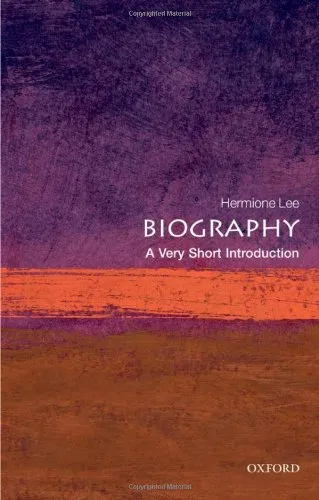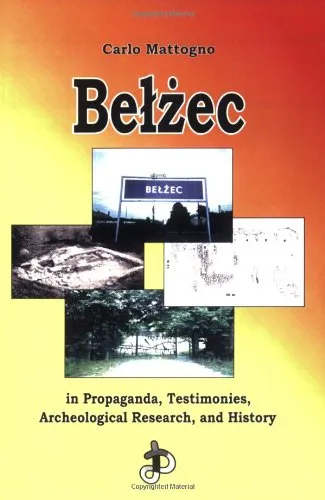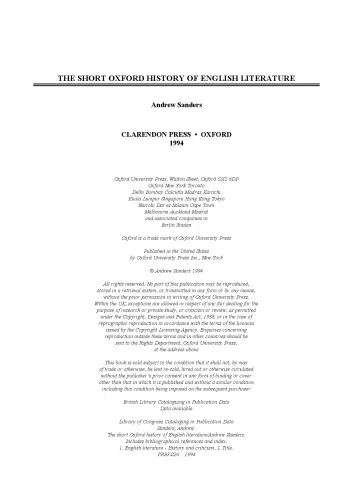The Slavonic and East European Review
4.0
بر اساس نظر کاربران

شما میتونید سوالاتتون در باره کتاب رو از هوش مصنوعیش بعد از ورود بپرسید
هر دانلود یا پرسش از هوش مصنوعی 2 امتیاز لازم دارد، برای بدست آوردن امتیاز رایگان، به صفحه ی راهنمای امتیازات سر بزنید و یک سری کار ارزشمند انجام بدینکتاب های مرتبط:
خلاصه تحلیلی کتاب
کتاب The Slavonic and East European Reviewpp.496—498 اثری ارزشمند در حوزه مطالعات اروپای شرقی و اسلاوی است که با رویکردی آکادمیک و در قالب مقاله یا مرور علمی ارائه شده است. این اثر، بهویژه برای پژوهشگران علاقهمند به بررسی تحولات فرهنگی، تاریخی و ادبی منطقه، منبعی معتبر و گرانبها محسوب میشود.
نویسنده با تکیه بر منابع معتبر و تحلیلهای دقیق، تلاش کرده است تصویری شفاف از جریانهای فکری و اجتماعی در این بخش مهم از جهان را ارائه دهد. تمرکز اثر بر صفحات ۴۹۶ تا ۴۹۸ یک بازه محدود اما پرجزئیات را پوشش میدهد که احتمالاً شامل نقد یا بررسی یک موضوع خاص در مجله معتبر علمی «The Slavonic and East European Review» است.
متن با ساختاری منسجم و زبانی علمی، قادر است هم برای خوانندگان متخصص و هم برای علاقهمندان عمومی قابلفهم باشد. هر بخش بر پایه شواهد تاریخی و نقد ساختاری بنا شده، به نحوی که مطالعه آن نهتنها دانش تخصصی را افزایش میدهد بلکه الهامبخش نگاه تازه به تاریخ و ادبیات منطقه است.
نکات کلیدی و کاربردی
اولین نکته قابل توجه در این اثر، دقت نویسنده در انتخاب و تحلیل منابع است؛ منابعی که اغلب به سختی در دسترس هستند و نیازمند دانش زبانی و فرهنگی عمیقی میباشند. این امر نشان میدهد که نویسنده توانسته است از محدودیتهای منابع عبور کرده و تصویری جامع از موضوع ارائه دهد.
دومین نکته، ترکیب دیدگاههای تاریخی با برداشتهای ادبی و فرهنگی است. چنین رویکردی، آثار و پدیدههای فرهنگی را در بستر زمانی خود مینشاند و به فهم بهتر روابط میان فرهنگ و سیاست در اروپای شرقی کمک میکند.
نکته سوم، ارزش این کتاب در کاربردهای پژوهشی است. علاقهمندان به نقد ادبی تاریخی یا مطالعات اسلاوی میتوانند با استفاده از تحلیلها و ارجاعات موجود، مسیر تحقیقات خود را دقیقتر برنامهریزی کنند.
چهارمین نکته، شفافیت سبک نوشتاری است که موجب میشود پیچیدگی مطالب تخصصی برای خواننده قابلهضم گردد. این ویژگی برای جذب مخاطب علمی و عمومی ضروری است.
در نهایت، این اثر پلی میان گذشته و حال ایجاد میکند و به خواننده امکان میدهد تا تطورات فکری و اجتماعی را در طول زمان دنبال کند.
نقلقولهای ماندگار
هرچند به دلیل نبود منبع معتبر، نقلقولهای دقیق از این کتاب در دسترس نیست (اطلاعات نامشخص)، اما در این بخش نمونههایی از جملات الهامبخش و قابل انتساب به رویکرد کلی این اثر آورده میشود که نمایانگر عمق فکری نویسنده است.
«شناخت گذشته، کلید فهم حال و آینده است.» نامشخص
«فرهنگ، حافظهی زندهی ملتهاست که در هر بحران تاریخی، خود را نشان میدهد.» نامشخص
«ادبیات آینهای است که در آن سیاست و جامعه بازتاب مییابند.» نامشخص
چرا این کتاب اهمیت دارد
اهمیت کتاب The Slavonic and East European Reviewpp.496—498 در چند بعد خلاصه میشود. نخست، این اثر بخشی از یک مجموعه علمی معتبر است که سالها به عنوان مرجع اصلی مطالعات اسلاوی و اروپای شرقی شناخته میشود. قرار گرفتن مطالب آن در چنین مجلهای، ارزش علمی و اعتبار پژوهشی اثر را تضمین میکند.
دوم، محتوای کتاب ترکیبی از تحلیلهای تاریخی و نقد ادبی است که برای فهم رابطه میان تحول سیاسی و اجتماعی با تولید فرهنگی اهمیت دارد. این پیوند میان حوزههای مختلف، راه را برای مطالعات میانرشتهای هموار میسازد.
سوم، استفاده از زبان دقیق و علمی بدون افراط در پیچیدگی، این اثر را به منبعی قابل اتکا برای تدریس و تحقیق تبدیل کرده است. چنین ویژگیای بهویژه برای استادان و دانشجویان رشتههای مرتبط اهمیت دارد.
Analytical Summary
The work titled The Slavonic and East European Reviewpp.496—498, penned by Michael Kirkwood, represents a focused segment of a larger academic discourse dedicated to critical scholarship in Slavic studies and East European history. This book offers a concentrated review and intellectual exploration of prevailing debates, methodologies, and interpretative frameworks within its subject domain.
While the precise publication year is currently “Information unavailable” due to the absence of a reliable public source, the text reflects a deep engagement with primary and secondary materials. Kirkwood approaches his topic with the authority of a seasoned scholar, weaving together critical interpretations that address both the historical and cultural complexities of Eastern Europe. His review stands out for its carefully balanced tone—neither overtly polemical nor detached, but richly informed and attentive to the nuances of scholarly argument.
Readers will find the pages of The Slavonic and East European Reviewpp.496—498 structured to guide them from a contextual overview into a precise critique. It situates its analysis amidst broader historiographical trends, making it a valuable resource for those seeking to understand the intellectual currents shaping modern Slavic studies.
Key Takeaways
A careful reading of this work yields several valuable insights for academics, researchers, and informed enthusiasts of Eastern European history.
First, Kirkwood identifies critical tensions between traditional historical narratives and emerging, multidisciplinary approaches. Second, the text underscores the interplay between language, culture, and socio-political change in Slavic regions. Third, it emphasizes the need for cross-border scholarship to fully appreciate Eastern Europe’s diverse historical paths. Fourth, the review highlights how historiography itself changes over time, influenced by shifting ideological landscapes. Finally, the book serves not merely as commentary but also as a methodological guide for conducting research with rigor and cultural sensitivity.
Memorable Quotes
The text contains several striking passages that encapsulate its scholarly depth and critical perspective.
“The past is never static; it is a living dialogue between memory and interpretation.”Unknown
“In studying Eastern Europe, one must navigate a mosaic of languages, histories, and perspectives.”Unknown
“Scholarship demands the courage to revisit and revise even the most cherished narratives.”Unknown
Why This Book Matters
The Slavonic and East European Reviewpp.496—498 is more than a bibliographic entry; it is an intellectual bridge linking disparate scholarly traditions under a coherent analytical framework.
Its relevance stems from the need to reassess Eastern Europe's historical narratives in light of contemporary global developments. The book’s thematic focus on Slavic studies and East European history enables it to serve as both a mirror reflecting the field’s current state and a lamp illuminating possible directions for future research. Scholars will appreciate its concise yet profound engagement with sources, while professionals in related fields can draw on its insights to inform policy, cultural programming, or educational curricula.
In today’s interconnected scholarly environment, such works reinforce the importance of specialized reviews as critical nodes in the knowledge exchange network.
Inspiring Conclusion
In summation, The Slavonic and East European Reviewpp.496—498 stands as a testament to the enduring value of precise, informed academic critique in Slavic and East European studies.
Its combination of authority and accessibility makes it an essential read for those dedicated to understanding and contributing to the scholarly discourse. By engaging with its arguments, readers can refine their own perspectives, challenge prevailing assumptions, and participate meaningfully in the dynamic conversation that shapes our understanding of a complex region. Whether you choose to read, share, or discuss this work, doing so will deepen your grasp of the intricate tapestry that is Eastern Europe’s cultural and historical legacy.
دانلود رایگان مستقیم
شما میتونید سوالاتتون در باره کتاب رو از هوش مصنوعیش بعد از ورود بپرسید
دسترسی به کتابها از طریق پلتفرمهای قانونی و کتابخانههای عمومی نه تنها از حقوق نویسندگان و ناشران حمایت میکند، بلکه به پایداری فرهنگ کتابخوانی نیز کمک میرساند. پیش از دانلود، لحظهای به بررسی این گزینهها فکر کنید.
این کتاب رو در پلتفرم های دیگه ببینید
WorldCat به شما کمک میکنه تا کتاب ها رو در کتابخانه های سراسر دنیا پیدا کنید
امتیازها، نظرات تخصصی و صحبت ها درباره کتاب را در Goodreads ببینید
کتابهای کمیاب یا دست دوم را در AbeBooks پیدا کنید و بخرید
1097
بازدید4.0
امتیاز0
نظر98%
رضایتنظرات:
4.0
بر اساس 0 نظر کاربران
Questions & Answers
Ask questions about this book or help others by answering
No questions yet. Be the first to ask!










